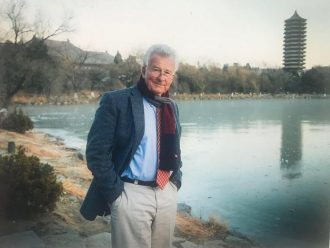
安樂哲教授
Professor Roger T. Ames
Humanities Chair Professor, Peking University
Professor Emeritus of Philosophy, the University of Hawai’i
Roger T. Ames is Humanities Chair Professor at Peking University, Co-Chair of the Academic Advisory Committee of the Peking University Berggruen Research Center, and Professor Emeritus of Philosophy at the University of Hawai’i. He is former editor of Philosophy East & West and founding editor of China Review International. Ames has authored several interpretative studies of Chinese philosophy and culture: Thinking Through Confucius (1987), Anticipating China (1995), Thinking from the Han (1998), and Democracy of the Dead (1999) (all with D.L. Hall), Confucian Role Ethics: A Vocabulary (2011), and most recently “Human Becomings: Theorizing ‘Persons’ for Confucian Role Ethics” (forthcoming). His publications also include translations of Chinese classics: Sun-tzu: The Art of Warfare (1993); Sun Pin: The Art of Warfare (1996) (with D.C. Lau); the Confucian Analects (1998) and the Classic of Family Reverence: The Xiaojing (2009) (both with H. Rosemont), Focusing the Familiar: The Zhongyong (2001), and The Daodejing (with D.L. Hall) (2003). Almost all of his publications are now available in Chinese translation, including his philosophical translations of Chinese canonical texts. He has most recently been engaged in compiling the new Sourcebook of Classical Confucian Philosophy, and in writing articles promoting a conversation between American pragmatism and Confucianism.
中國:尋找屬於自己的現代性

摘要:
中國到了現在──21世紀過了差不多二十年──才剛起步構築屬於自己現代性。自19世紀下半葉,中國和其他仰慕西方現代性的東亞文化,開始建構一套新的概念語言,冀把西方傳統融入本土文化,以一套外來的現代性語言,啟發本土的發展。西方的教育制度和課程,就是在這樣的背景下,全盤引進東亞的學院;亞洲學者,固然因此而接觸到產生新知識的工具和方法,但也犧牲了自己的身分。這種影響,延續至今,因為東亞傳統的概念化、理論化,仍然是以一套西方現代性的語言去操作,在外國如是,在本土學院也如是。
要進一步理解屬於中國自身的現代性,方法之一,就是反思在漢語翻譯的過程中,如何通過調整而把翻譯「本土化」(套用施萊爾馬赫的講法)。譬如說,用以翻譯“universal” 一詞的「普遍」,在用法上,意思是「遍佈各處的、常見的、普通的、共同的」;「超越」,作為 “transcendence” 的中譯,意指「一個內在體的外圍限度」,而非嚴格哲學意義上的 “transcendence”:一個外在的、獨立的、普遍的、自足的標準。
或許,最有趣的現象就是:在當代西方論述裡,隨著「超越普遍性」備受質疑,語言的發展,正在往「取代超越普遍性」的方向進行;這個過程與儒家思想的論述,正好不謀而合。
Theorizing “Persons” for Confucian Role Ethics: A Good Place to Start

摘要:
In 2011, I published Confucian Role Ethics: A Vocabulary in which I argue that Confucian philosophy’s encounter with Western ethical theory is not its defining moment. Indeed, I try to use the Confucian ethical vocabulary to express its own sui generis vision of the moral life as Confucian role ethics. On reflection, I am not sure that I have been able to convey in sufficiently clear terms the Confucian conception of a relationally-constituted person. At the same time, I am persuaded that this is one of the most important contributions Confucian philosophy has to make to our contemporary ethical, social, and political discourse as a robust alternative to single actors playing to win.
G.W.F. Hegel in the introduction to his Encyclopaedia Logic famously observes that one of the most difficult problems in any philosophical investigation is the question of where to begin. In this lecture, I will argue that the appropriateness of categorizing Confucian ethics as role ethics turns largely on the conception of person that is presupposed within the interpretive context of classical Chinese philosophy. If our goal is to take the Confucian tradition on its own terms and to let it speak with its own voice without overwriting it with our own cultural importances, we must begin by first self-consciously and critically theorizing the Confucian conception of person as the starting point of Confucian ethics.
The problem of using Western categories—today, virtue ethics—to theorize Confucian philosophy is an old and persistent story. In our own time, but with deep roots in the classical Greek philosophical narrative, individualism has become a default, commonsense assumption, if not an ideology. I will argue that the vocabulary of agents, acts, generic virtues, character traits, autonomy, motivation, reasons, choice, freedom, principles, consequences, and so on, introduces distinctions that assume this foundational individualism as its starting point.
And further, I will claim that Confucian ethics by contrast begins from the wholeness of experience, and is formulated by invoking a radically different focus-field cluster of terms and distinctions with fundamentally different assumptions about how personal identities emerge in our human narratives, and how moral competence is expressed as an achieved virtuosity in the roles and relationships that come to constitute us. To fail to distinguish what I will call individual human “beings” from relationally-constituted “human becomings,” then, would mean that we have willy-nilly insinuated a contemporary and decidedly foreign notion of person into our investigation before it has even begun.




